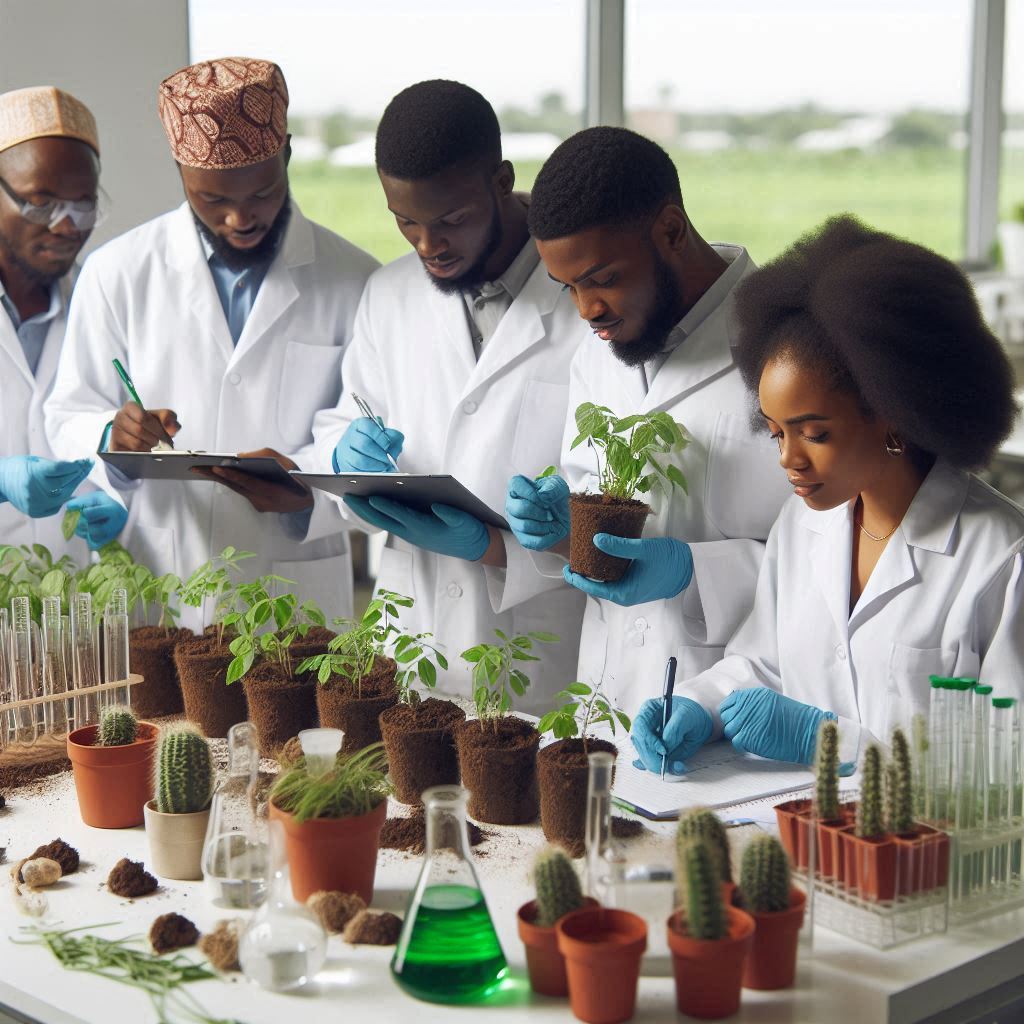Introduction
Agricultural science workshops in Nigeria play a crucial role in boosting the nation’s agricultural sector.
They provide hands-on training and vital knowledge to farmers and agricultural enthusiasts, fostering a more informed farming community.
These workshops cover a broad range of topics, including crop cultivation techniques, soil management, and pest control strategies, which are essential for improving yield and quality.
They also address modern agricultural technologies, such as precision farming and irrigation systems, which help increase productivity and sustainability.
By attending these workshops, farmers learn to optimize their resources efficiently, making better use of land, water, and inputs.
Additionally, they gain insights into effective marketing strategies for their produce, which can help them reach broader markets and improve their income.
Workshops often emphasize the importance of sustainable farming practices, promoting methods that protect and enhance the environment.
This approach ensures long-term agricultural success and environmental preservation, crucial for the country’s future.
Participants also explore livestock management and aquaculture, broadening their agricultural expertise.
This comprehensive education supports Nigeria’s agricultural diversity, enabling farmers to diversify their operations and reduce risks associated with single-crop dependency.
Agricultural science workshops ultimately empower farmers, enhance food security, and drive economic growth.
They are indispensable for modernizing Nigeria’s agricultural practices and ensuring a robust agricultural future.
These workshops serve as a foundation for building a resilient agricultural sector that can adapt to challenges and seize opportunities.
Overview of Agricultural Science Workshops in Nigeria
Background Information on the Availability and Popularity of Agricultural Science Workshops in Nigeria
Agricultural science workshops in Nigeria are widely available and increasingly popular.
They cater to farmers seeking to enhance their skills and knowledge.
These workshops have become essential due to Nigeria’s agricultural potential and the need for improved practices.
Various organizations, including government bodies, NGOs, and universities, conduct these workshops.
They aim to address different aspects of agriculture, ensuring comprehensive coverage and reach.
Different Types of Workshops Conducted Across the Country
Workshops on crop cultivation techniques are common, focusing on improving yield and quality.
Soil management sessions teach farmers how to maintain soil health and fertility.
Pest control workshops help farmers combat pests effectively, reducing crop losses and ensuring healthier crops.
Modern agricultural technologies, such as precision farming and irrigation systems, are also frequently covered.
These technologies help farmers optimize resource use and increase productivity.
Livestock management workshops provide insights into efficient and sustainable animal farming practices.
These sessions cover animal health, breeding techniques, and feed optimization.
Aquaculture workshops teach fish farming techniques, expanding opportunities for farmers to diversify their operations.
These workshops often include practical demonstrations, making the learning experience more engaging and effective.
Workshops on agribusiness and marketing strategies help farmers reach broader markets and improve their income.
These sessions teach farmers how to create value-added products and navigate the market effectively.
Additionally, climate-smart agriculture workshops address the challenges of climate change.
They provide strategies for adapting farming practices to changing environmental conditions.
These diverse workshops ensure that farmers across Nigeria can access the training they need.
This widespread availability enhances the country’s agricultural productivity and sustainability.
By attending these workshops, farmers become better equipped to face agricultural challenges.
They also contribute to the overall growth and development of Nigeria’s agricultural sector.
Read: Curriculum Studies Student Resources in Nigeria
Benefits of Participating in Agricultural Science Workshops
Attending agricultural science workshops can provide numerous benefits for individuals interested in the field.
These workshops offer a hands-on learning experience that can enhance knowledge and skills in agriculture.
Enhancing Knowledge and Skills
- Workshops provide practical training in various aspects of agriculture, such as crop production, livestock management, and sustainable farming practices.
- Participants have the opportunity to learn from experienced professionals and gain valuable insights into the latest trends and technologies in the industry.
- Hands-on activities and demonstrations help reinforce theoretical concepts and allow attendees to gain practical experience in agricultural practices.
- Workshops often include interactive sessions where participants can ask questions, share their own experiences, and engage in discussions with experts in the field.
- By participating in workshops, individuals can expand their knowledge base, develop new skills, and stay up-to-date with advancements in agricultural science.
Potential Career Opportunities
- Attending agricultural science workshops can open doors to a variety of career opportunities in the agriculture sector.
- Participants can explore different career paths within agriculture, such as farm management, agribusiness, agricultural research, and extension services.
- Workshops provide valuable networking opportunities where individuals can connect with professionals, potential employers, and experts in the field.
- Networking with industry professionals can lead to job referrals, internships, mentorship opportunities, and collaborations on research projects.
- Building a strong network of contacts in the agriculture industry can help individuals advance their careers, gain new perspectives, and access potential job openings.
Overall, participating in agricultural science workshops can significantly benefit individuals interested in pursuing a career in agriculture by enhancing their knowledge, skills, and networking opportunities in the field.
Read: Implementing Tech in Nigerian Classrooms
Notable Agricultural Science Workshops in Nigeria
When it comes to agricultural science workshops in Nigeria, there are several organizations and workshops that stand out for their remarkable contributions to the agricultural sector.
These workshops cover a wide range of topics and play a significant role in shaping the future of agriculture in Nigeria.
Songhai Center
The Songhai Center is one of the most well-known agricultural training centers in Nigeria. They offer workshops on sustainable farming techniques, agribusiness management, and value chain development.
National Youth Service Corps (NYSC) Agricultural Development CDS Group
The NYSC Agricultural Development CDS Group conducts workshops that focus on rural farming practices, food security, and agricultural extension services.
They actively engage youth in agricultural activities.
Africa Fertilizer and Agribusiness Partnership (AFAP)
AFAP organizes workshops on soil fertility management, crop nutrition, and fertilizer use to increase agricultural productivity in Nigeria.
They work closely with farmers and stakeholders to promote sustainable agricultural practices.
Youth Employment in Agriculture Programme (YEAP)
YEAP workshops cover topics such as youth entrepreneurship in agriculture, value addition, and market access. They aim to empower young people to take up careers in agriculture and contribute to the sector’s growth.
Impact of These Workshops on the Agricultural Sector
- These workshops enhance the knowledge and skills of farmers, extension agents, and agribusiness owners.
- They promote the adoption of modern and sustainable farming practices, leading to increased yields and income for farmers.
- Workshops like these help bridge the knowledge gap and promote innovation in the agricultural sector.
- They foster a culture of collaboration and knowledge sharing among stakeholders in the agriculture value chain.
- By empowering youth and farmers with the right skills and knowledge, these workshops contribute to the overall growth and development of the agricultural sector in Nigeria.
Overall, the impact of these agricultural science workshops in Nigeria cannot be underestimated.
They play a crucial role in building a sustainable and resilient agricultural sector that can meet the growing food demands of the country while improving the livelihoods of farmers and communities.
Read: Tech Tools for Nigerian Curriculum Developers

Challenges and Opportunities in Agricultural Science Workshops
When it comes to agricultural science workshops in Nigeria, there are both challenges and opportunities that participants and organizers face.
These factors play a significant role in shaping the success and impact of these workshops.
Identifying Common Challenges
Access to Resources
One of the most common challenges faced by participants in agricultural science workshops is access to resources.
This includes funding, equipment, and materials needed to conduct experiments and research.
Lack of Funding
Many workshops struggle with securing adequate funding to cover operational costs, such as venue rental, transportation for speakers, and marketing expenses.
This financial constraint can limit the quality and reach of the workshops.
- Limited Infrastructure
Some regions in Nigeria lack the necessary infrastructure, such as laboratories and demonstration farms, to support hands-on learning experiences in agricultural science workshops.
This can hinder the practical application of theoretical knowledge.
Lack of Technical Expertise
Participants may face challenges in finding skilled professionals who can provide specialized training and guidance in various aspects of agricultural science.
Without expert mentorship, the learning outcomes may be limited.
Exploring Potential Opportunities
Collaboration with Industry Partners
One of the key opportunities for agricultural science workshops in Nigeria is to collaborate with industry partners, such as agricultural companies, research institutions, and government agencies.
These partnerships can provide access to valuable resources, expertise, and funding.
Government Support and Policies
Government support through policies, grants, and subsidies can create an enabling environment for the development of agricultural science workshops.
By aligning with national priorities and initiatives, these workshops can receive institutional backing and recognition.
Integration of Technology
Embracing technological advancements, such as precision agriculture tools, data analytics, and remote sensing technology, can enhance the effectiveness and efficiency of agricultural science workshops.
Participants can learn how to leverage digital solutions for sustainable agricultural practices.
Capacity Building Programs
Organizers can offer capacity building programs and professional development opportunities for participants to enhance their skills and knowledge in agricultural science.
By investing in human capital, workshops can empower individuals to drive innovation and growth in the agricultural sector.
Overall, while there are challenges to overcome in agricultural science workshops in Nigeria, there are also numerous opportunities for collaboration, growth, and innovation.
By addressing the common barriers and leveraging the existing strengths, these workshops can continue to contribute to the development of sustainable agriculture in the country.
Read: Tech-Enhanced Learning in Nigerian Schools
Success Stories from Agricultural Science Workshops
Sharing Stories of Individuals or Communities Who Have Benefited from Participating in Agricultural Science Workshops
Agricultural science workshops in Nigeria have transformed many lives and communities.
By sharing these success stories, we can highlight their profound impact.
Farmers who attended these workshops often experience significant improvements in their agricultural practices and productivity.
One such success story comes from a farmer in Kaduna.
Before attending the workshops, his yield was low, and profits were minimal.
He decided to attend a series of agricultural science workshops on crop cultivation and soil management.
These workshops taught him effective farming techniques, including crop rotation and organic fertilization methods.
After implementing what he learned, his crop yield doubled.
This dramatic improvement not only increased his income but also inspired his neighbors to follow suit.
In Ogun State, a women’s cooperative group benefited greatly from aquaculture workshops.
Initially, they struggled with traditional farming, facing low yields and high pest infestation.
The aquaculture workshops introduced them to fish farming.
They learned everything from pond construction to fish nutrition and health management.
Today, their cooperative runs a successful fish farming business, providing a steady income and enhancing food security in their community.
Another remarkable story is from a youth group in Enugu.
They participated in workshops focusing on modern agricultural technologies.
These young farmers learned about precision farming, which uses technology to optimize field-level management.
They adopted these technologies and saw a 40% increase in productivity.
This success has encouraged more young people to consider careers in agriculture, reducing youth unemployment in their area.
The Positive Outcomes and Impact of These Workshops on the Agriculture Sector in Nigeria
These success stories demonstrate the positive outcomes of agricultural science workshops in Nigeria.
They show how knowledge and training can empower individuals and communities.
By improving farming techniques, increasing yields, and promoting sustainable practices, these workshops contribute significantly to the agricultural sector’s growth.
The impact of these workshops extends beyond individual success.
They foster community development, enhance food security, and stimulate economic growth.
As more farmers and communities participate in these workshops, the collective benefits will continue to grow.
These success stories inspire others to invest in agricultural education and training, ensuring a brighter future for Nigeria’s agriculture sector.
Conclusion
Reflecting on the current status of agricultural science workshops in Nigeria, it is evident that these platforms play a crucial role in the advancement of agriculture in the country.
With the potential for growth and expansion in this sector, it is essential that continued support and investment are made to ensure the sustainable development of agriculture.
By providing farmers, researchers, and other stakeholders with access to innovative technologies and information, these workshops contribute significantly to the improvement of agricultural practices in Nigeria.
Furthermore, the collaboration and networking opportunities offered by these workshops foster knowledge-sharing and capacity-building within the agricultural community.
In the end, the importance of agricultural science workshops cannot be overstated.
They are key drivers of progress in the agricultural sector and are instrumental in shaping the future of agriculture in Nigeria.
It is crucial that stakeholders continue to support and invest in these workshops for the overall benefit of the country.




